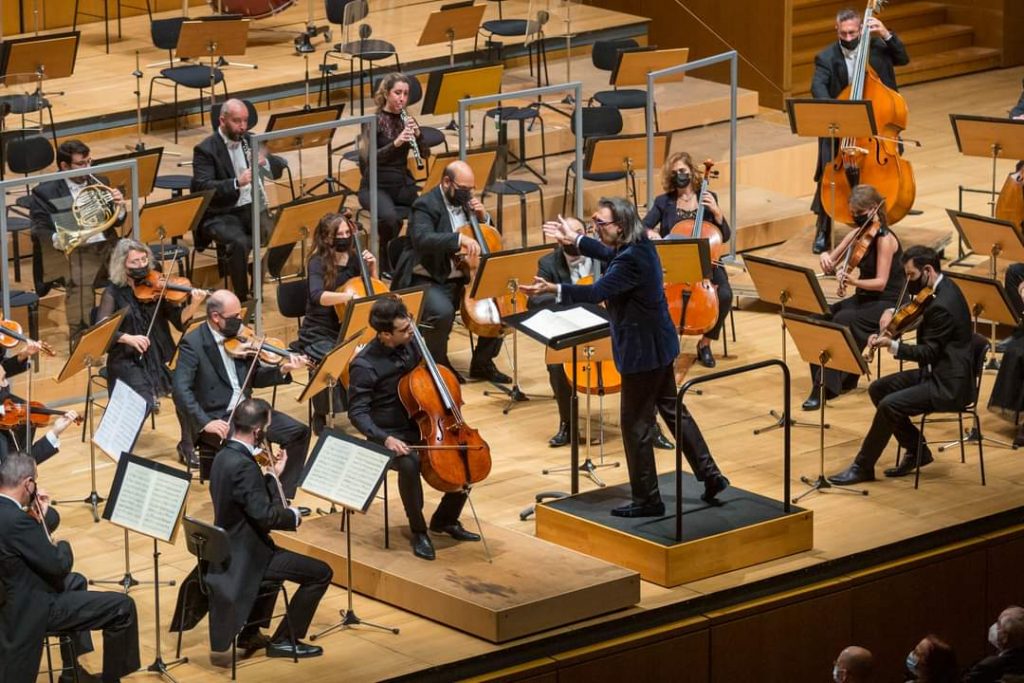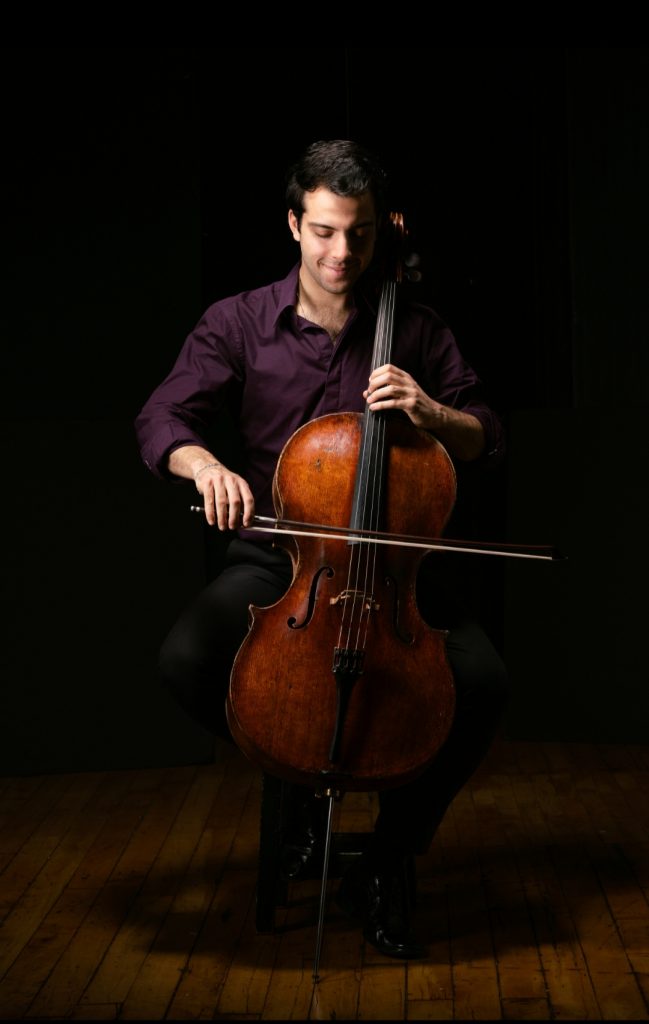General News
Meropi Kyriacou Honored as TNH Educator of the Year
NEW YORK – Meropi Kyriacou, the new Principal of The Cathedral School in Manhattan, was honored as The National Herald’s Educator of the Year.

ATHENS – Cellist Timotheos Gavriilidis-Petrin, a graduate of the Curtis Institute of Music and the New England Conservatory, spoke with The National Herald about his upcoming performances along with other distinguished musicians of the younger generation with Leonidas Kavakos at the Athens Megaron: ‘Kavakos and Friends’ on February 12 and 14.

TNH: How did you decide to pursue a career, or better, a life, in music? How did your particular interest in classical music come about? Why cello?
Timotheos Gavriilidis-Petrin: I wouldn’t say that I ever had to make a decision. Music sort of decided for me early on. My parents are pianists and my brother a violinist, therefore music has always been an integral part in my daily life, or even the very center of my daily routine. As they say, the apple doesn’t fall far from the tree – plus rebellion and desertion were never my forte. I started as a pianist at the age of 6 and a year later I picked up the cello as it was my mother’s idea to create a trio within our family. The rest unfolded quite smoothly.

TNH: Where did you study? How is your art affected by your Greek and Russian side?
TGP: I began my musical studies at the State Conservatory of Thessaloniki in Greece. These were some truly great years. The Conservatory brought color and a sense of belonging to our lives as both my brother and I were bonding with students of our age that shared the same dreams and aspirations for music. It felt like we were part of a family, or rather, a very well hidden society of young bohemians, swallowed by the mundane urban reality around us.
When I turned 18, I was accepted at the Curtis Institute of Music in Philadelphia. It was perhaps the greatest and most life changing step in my career. The school shaped my identity as a musician and made me aware of so many things that I was ignorant of at the time. I am still very closely tied to Curtis. Soon after, I pursued my graduate degree at the New England Conservatory in Boston and concluded my studies in 2021. Having both a Greek and a Russian background was a challenge, especially in the early years when one is trying to figure oneself out. I would say though that this combination was beneficial in many spiritual and creative aspects of both mine and my brother’s personalities. We were very much influenced by Russian culture – reading the literature, watching Russian movies and documentaries, and listening to recordings of so many great Russian musicians of the 20th century. At the same time the surroundings around us in our daily lives were embedded with the Greek flavor – this very special energy and light that is still in many ways untouched from the known reality of the Western world. It was a good recipe.

TNH: What is your creative process? How do you approach a work new to you and how do you approach a new (contemporary) work?
TGP: My approach is the same regardless of the time period the work was written in. I generally tend to shift my attention from larger structures to smaller ones. I first focus on the bigger scope of a piece, the so-called outline, trying to understand the essence of it. After that I move deeper into details and smaller units that I find vital to the nature of the piece or closer to my heart. Then I sort of connect the dots. The element of our work as musicians is not only sound. Time and space are an equally important part of our creative process.
TNH: Is there room for innovation when playing a piece like a Bach suite or Dvořák’s Cello Concerto, something that so many interpreters have approached before? What is the meaning of playing the great works of the past for an artist? For the audience? What does classical music means for the “mere mortals” beyond the two hours of time in a concert?
TGP: There is always room for innovation. Listening to classical music is very much an introspective/cerebral experience that targets people’s psyche, including the performer’s. The circumstances and outcome of each concert experience is different, as the energy flow between audience and performer constantly changes. Live performances always bring revelations for everybody, regardless of the music being played. It is like a communion of sorts. All we need is open minds with no expectations or ties to preconceived perceptions.
TNH: What are your latest performances/recordings and what are your future plans?
TGP: These past few months I have been quite busy performing with my piano trio, Trio Zimbalist, in both the U.S. and Europe. Last month we recorded our first album which is going to be released next fall with the Curtis Studio Label. The rest of the season will be equally exciting for me as I will continue performing as a soloist and chamber musician in both continents.
TNH: You are now very often working with Leonidas Kavakos. Could you tell us more about this musical experience and the upcoming program at the Athens Megaron?
TGP: I first met Leonidas back in 2014 in the annual masterclasses that he gives in Athens. The following years I was trying to attend many of his concerts on the East Coast out of sheer admiration and respect for his musicianship. In 2021, I got a phone call from the Athens State Orchestra asking me to play the Haydn Concerto with Leonidas conducting. I was shocked to say the least. The performance went really well – an unforgettable experience. Since then, we have collaborated numerous times in chamber music performances, including a concert for Ukraine back in April 2022. Leonidas has been incredibly supportive and giving, both as a person and musician. His advice, care and wisdom are threads that I am beyond grateful for. We will soon be collaborating again on February 12th and 14th at the Megaron in Athens. The program will include some of the most celebrated and revered works of the chamber music repertoire.

TNH: Your father comes from Russia, a country with an immense cultural heritage which has been a center of classical music for centuries, but you perform also in small places in Greece and in the U.S., among many others. Is there a difference for the “function” of music between these places?
TGP: I would say that the function of music does not change depending on where it’s performed. Music is the same for everybody.
Having played in many venues around the world though, I’ve seen that the way people react to music is different. In the West, audiences increasingly think of the artist as a protagonist or the very center of the event rather than the mediator for the music itself, which conception I believe is a product of the classical music industry being in constant and excessive fear of empty seats. I find that people in the East are far more curious and appreciative of the music itself as an entity. Don’t quote me on this though. Just a thought.
NEW YORK – Meropi Kyriacou, the new Principal of The Cathedral School in Manhattan, was honored as The National Herald’s Educator of the Year.

MELBOURNE, Australia (AP) — More than 100 long-finned pilot whales that beached on the western Australian coast Thursday have returned to sea, while 29 died on the shore, officials said.
LORAIN, OH – Fr. Michael Gulgas, 67 of Amherst, fell asleep in the Lord, on the mid-Lenten celebration of the Holy Cross in St.
The issue of what to do at our southern borders inexorably drags on, leaving a tidal wave of decisions awaiting answers in big and small cities.
A television host recently asked me: “Donald Trump is revered by so many and reviled by so many others.
As we head toward the culmination of the divine drama and the celebration of Holy Pascha, this special time is prime for sharpening our spiritual senses, but also contemplating certain qualities of our cultural otherness that shape our worldview and unique historical standpoint.